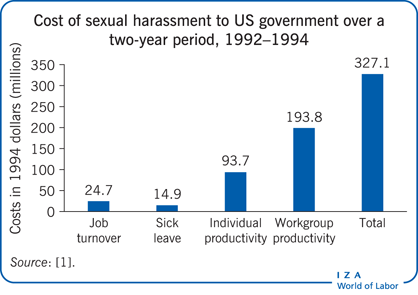Elevator pitch
Workplace sexual harassment is internationally condemned as sex discrimination and a violation of human rights, and more than 75 countries have enacted legislation prohibiting it. Sexual harassment in the workplace increases absenteeism and turnover and lowers workplace productivity and job satisfaction. Yet it remains pervasive and underreported, and neither legislation nor market incentives have been able to eliminate it. Strong workplace policies prohibiting sexual harassment, workplace training, and a complaints process that protects workers from retaliation seem to offer the most promise in reducing sexual harassment.
Key findings
Pros
Largely overlooked until the 1970s, sexual harassment in the workplace is now internationally condemned as a form of sex discrimination and a violation of human rights.
More than 75 countries have legislation prohibiting workplace sexual harassment.
Legislation varies by country and includes protection against workplace sexual harassment under both civil and criminal law.
Like workers at risk of injury or death, those at risk of sexual harassment receive a pay premium.
Organizations have prohibited sexual harassment and have established complaint procedures.
Cons
Sexual harassment is difficult to define, measure, and monitor.
Sexual harassment is underreported, which reduces the efficacy of legislation and workplace policies prohibiting it, as these policies depend on reporting to discourage harassment.
Workers who report sexual harassment are likely to be subject to retaliation.
Women face a higher risk of sexual harassment than men.
Sexual harassment is costly to its victims and to the organizations in which it occurs.
